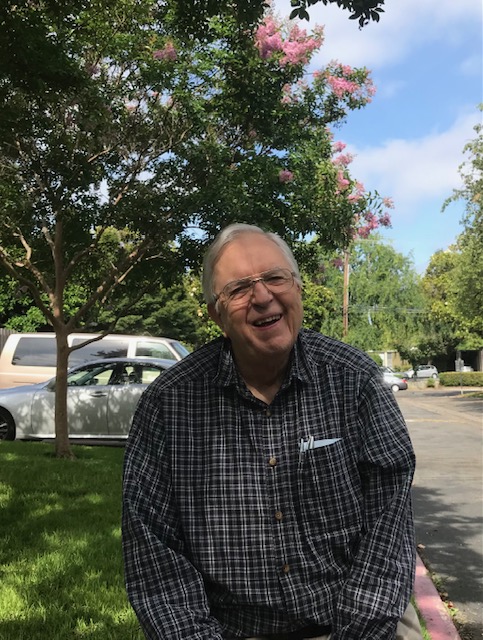May of 2022 was not fun for me. I was sleeping poorly, rushed to the ER for treatment of Septic Shock. Came home but then endured a week of Covid. Slept fitfully less than three hours sleep for most of May. Concerned friends gathered and prayed. I assumed it was finally my time to die. But when I tried holding my breath until I expired, I found that way or forcing God's hand doesn't work.
My main daily activity since is writing. Few people read what I write so it's an archive for another time, another generation. Or it can all go in the dumpster when my heirs take over. When I became a Christian Paul's letters to the Corinthians were favorites.
My observations: The social order has decreased greatly in my lifetime. This is why I see history as characterized by increasing entropy. There is, however, no need for anyone to be left behind.
Your email is welcome. I'm still able to answer almost all of it. My web site (originated in 1995), has just everything I've ever written. The most recent stuff is in the Library Annex.
Last week we left our hero, the Apostle Paul, 'back at the ranch' in Antioch of Syria. There he enjoyed a short but well-deserved rest after the two to three years he had spent on his second missionary journey, during which he had carried the gospel to Europe. But he did not rest for long. Luke continues the story immediately with Verse 23 of Chapter 18.
After spending some time there he departed and went from place to place through the region of Galatia and Phrygia, strengthening all the disciples. (Acts 18:23 RSV)
On his third missionary journey, the apostle starts out all alone. He has no Barnabas or Silas with him this time. But he is heading out to familiar ground, to minister among dear friends whom he personally had led to Christ. His purpose is to strengthen the churches. Paul loved to venture into new territories, but he never forgot the need to strengthen those already won. So he devotes this third missionary journey to the training of the disciples.
That meant that he went about among the churches in Galatia and Phrygia teaching them the Word of God, for it is the Word that strengthens. In his letter to the Galatians he cites the fact that he came among them telling them the truth. Remember that Jesus, in his high priestly prayer recorded in John 17, says to the Father concerning his disciples, "Sanctify them in the truth; thy word is truth..." (John 17:17 RSV). This is what builds Christians up -- the knowledge of the Word of God, and obedience to that word! That is why it is so important that we become men and women, boys and girls, saturated with the knowledge of the truth, the Word of God.
This is the instrument that produces maturity. Paul, as an apostle, well knew that there is no chance for maturity without the Word of God. You cannot grow as a Christian without a continually increasing understanding of the Word. And there is no chance for effective evangelism to continue without maturity. Today we see so many instances in which there is an attempt to whip up an artificial kind of evangelism without laying the groundwork of maturity. Though any Christian can witness, right from the day he is born again, there can be no effective, continuing evangelism without the spiritual growth which involves maturing in the understanding of the Scriptures. So the Apostle went about ministering to the churches in this way.
The next section is a parenthesis which Dr. Luke inserts in this account of Paul's ministry, to explain what happened when Paul finally reached Ephesus. I never have been able to understand the incredible positioning of the chapter divisions in our New Testament. Many come at the wrong place. This certainly is one, for this story continues into the opening section of Chapter 19 and the chapter division is a break that does not belong. Luke interjects this parenthetical passage to introduce us to Apollos:
Now a Jew named Apollos, a native of Alexandria, came to Ephesus. He was an eloquent man, well versed in the scriptures. He had been instructed in the way of the Lord; and being fervent in spirit, he spoke and taught accurately the things concerning Jesus, though he knew only the baptism of John. (Acts 18:24-25 RSV)
Now we have met this golden-voiced orator of the first century. He was not a Christian at this time; he was a Jew, as Luke tells us. He had been trained in the Jewish schools at Alexandria in Egypt and had become a powerful speaker, well versed in the Scriptures -- literally "mighty" in the Scriptures. But of course he could only go as far as he himself knew and understood. No preacher can ever lift his congregation above his own spiritual experience. Apollos knew only the baptism of John. Now, that was a lot. That was the truth about Jesus, but it was not the whole truth.
This term, "the baptism of John," means the message which John preached. When John the Baptist went out into the wilderness of Judea and began to preach, about six months before our Lord appeared, the inhabitants of Jerusalem and the cities of Judea were taken by the ministry of this mighty preacher and went out into the desert to hear him. He did not come to them; they went to him -- which indicates that his message was a startling one for his day. John's message does not appear to us to be so startling because we have the full-orbed presentation of Christianity. But to the people of his day it hit like a sledge hammer.
It consisted primarily of three great truths which John declared: First that, before God, forgiveness of sins is possible only on the basis of repentance. Thus there was no longer any need to bring a sacrifice or offering. That was a startling message to these Jews. They had been told that the only way they could have their sins forgiven was by means of an animal substitute whose blood was shed on their behalf. Thereby God passed over their sins -- accepted, temporarily at least, the blood of the animal on their behalf, and forgave their sins. But John came with the startling word that all God really wanted was a repentant heart. John had the people express their repentance in baptism, which was a symbolic act of cleansing. This also was something new. In the Old Testament you can read in the Law about certain cleansings in which, after fulfilling a sacrifice, the bringers of the sacrifice would wash themselves. This was similar to baptism, but not quite the same. John came announcing that as people repented, changed their mind about their evil, called it what God called it, and forsook it, God forgave their sins. The symbol of that forgiveness was the washing of baptism. And John insisted that their repentance had to be real, insisted that they actually produce fruit that befitted repentance. That is, their actions had to demonstrate that they really meant what they said and would indeed turn from their evil. He met several different groups of people and told them specific things that they could do in order to indicate that they really had judged themselves before God. Third was his announcement that there was coming One who would complete the work he had begun. Repentance is just a beginning with God. It is as far as we human beings can go by ourselves, but it does not give us life. Repentance would achieve forgiveness of sins, but it would not give us any positive ground of action, any power by which to live. That is what John announced would be available when Jesus came. "There is coming one after me," he said, "who is mightier than I, whose shoes I am not worthy to carry. I have baptized you with water, as a symbol of the forgiveness God gives. But he will go further; he will baptize you with the Holy Spirit. He will put life into you. He will give you power. He will pour into you that which it takes to live as God asks. That I can't do." (Matthew 3:11, Mark 1:7, Luke 3:16).
So Apollos knew this much, but he knew nothing of the cross, nor of the resurrection, and he did not know of the coming of the Holy Spirit on the day of Pentecost. His message was basically incomplete. He announced the word about Jesus but he said nothing about those three essentials which make it possible for the word of Jesus to be experienced in our own life: His death, his resurrection, and the coming of the Holy Spirit. Luke now records what happened next:
He began to speak boldly in the synagogue; but when Priscilla and Aquila heard him, they took him and expounded to him the way of God more accurately. And when he wished to cross to Achaia, the brethren encouraged him, and wrote to the disciples to receive him. When he arrived, he greatly helped those who through grace had believed, for he powerfully confuted the Jews in public, showing by the scriptures that the Christ was Jesus. (Acts 18:26-28 RSV)
Here in the synagogue in Antioch began a most excellent Christian practice -- inviting the preacher home to dinner. Aquila and Priscilla were Christians. It is interesting to note that they still met on the Sabbath with the Jews in the synagogue, though undoubtedly they also had Christian meetings in their home, probably on Sunday, the first day of the week, the day of resurrection. Here they are in the synagogue and they hear Apollos preach Jesus. He preached the things concerning Jesus very accurately, Luke tells us. They were warmed and expectant because of that, but they soon learned that there was something missing.
So they did a beautiful thing -- they invited him home to dinner with them and helped him with his problems. I do not know which to admire more in this situation, Aquila and Priscilla, or Apollos. These two dear Christians, not too old in the Lord themselves, having been led to Christ by Paul in Corinth, do not scorn this young man for his incomplete preaching. They do not write letters to the editor about him, or reject him, or criticize him, but instead they invite him home, and, lovingly and wisely, expound to him the more accurate presentation of Christ. That means that they went back into the Old Testament Scriptures. They showed how the Old Testament indicated the death and resurrection of Christ, and the coming of the Holy Spirit. They expounded to him so that his faith would rest not merely upon their testimony of the historic occurrences, but also on the predictions of the Old Testament.
But I really do not know if they were greater in all this than Apollos, who was willing to sit in this way under the teaching of members of his congregation and humbly listen to them. What amazing news it must have been to Apollos that the message of John had now been fulfilled, that the one whom John had baptized had gone on to fulfill all that God had ever predicted concerning the way of salvation for men. The implications of the cross, the resurrection, and the coming of the Holy Spirit were all explained to Apollos.
Naturally he needed time to digest these facts and to rethink it all. There is no indication here that he immediately began to preach this new truth at Ephesus. Rather, he desired to go over to Corinth, probably because there was a congregation of believers there who had been instructed by the Apostle Paul. Aquila and Priscilla, his teachers, had been led to Christ by Paul in Corinth, and so Apollos wanted to go where he could learn more about what he had heard. The brethren in Ephesus sent letters of recommendation with him so that the brethren in Corinth would receive him.
He was a great help to them when he came. Here was a man who knew the Old Testament Scriptures. "When he arrived, he greatly helped those who through grace had believed," doing what he could do best, answering the arguments of the Jews right in public, proving from the Scriptures that Jesus was the Christ. And how much more could he do this now, armed with the new facts he had learned concerning the Lord Jesus! In his first letter to the Corinthians, Paul acknowledges the fact that he had planted, but Apollos had watered 1 Corinthians 3;6). Paul was grateful for the ministry of this mighty man of the Scriptures who could thus confirm and strengthen the word that he had planted there. In the next section, Paul appears again:
While Apollos was at Corinth, Paul passed through the upper country and came to Ephesus. There he found some disciples. And he said to them, "Did you receive the Holy Spirit when you believed?" And they said, "No, we have never even heard that there is a Holy Spirit." And he said, "Into what then were you baptized?" They said, "Into John's baptism." (Acts 19:1-3 RSV)
After visiting these churches of Galatia and Phrygia, Paul came to Ephesus just as he had promised at the close of his second journey. You remember that Luke tells us:
And they came to Ephesus, and he left them [Priscilla and Aquilla] there; but he himself went into the synagogue end argued with the Jews. When they asked him to stay for a longer period, he declined; but on taking leave of them he said, "I will return to you if God wills," and he set sail from Ephesus. (Acts 18:19-21 RSV)
Now he is fulfilling that promise, returning to Ephesus. Naturally he went to the synagogue where he had been invited to stay. When he came into the Jewish community there at Ephesus he found certain disciples. We are not told whose they were, but, linking this with the previous account, it is clear that these were disciples of Apollos. They were men and women whom he had told about Jesus, at least to the extent of the baptism of John. Paul heard them speaking about Jesus. He obviously thought they were Christians when he first met them. But, as he watched them, he observed that something was missing, and I am sure there is puzzlement in his voice when finally he says to them, "Did you receive the Holy Spirit when you believed?"
This question indicates that the normal Christian pattern is that the Spirit is given immediately upon belief in Jesus Christ. The King James Version says "since you believed," but that is not a proper translation. The word in Greek is clearly when. There is no suggestion here that the Spirit of God is given a long period after belief in Christ. Jesus had predicted that it would be immediate. In the seventh chapter of John we are told that on the great day of the feast Jesus stood up and proclaimed, "If any one thirst, let him come to me and drink. He who believes in me, as the scripture has said, 'Out of his heart shall flow rivers of living water...'" (John 7:37b-38 RSV). John adds, "Now this he said about the Spirit, which those who believed in him were to receive..." (John 7:39a RSV). So it is belief in Jesus which brings the Holy Spirit.
This is what puzzled Paul. These people knew something about Jesus. They appeared to be disciples of Jesus. But there was something missing. What it was we are not told. Perhaps Paul saw that there was no joy in their lives, or no peace or certainty. Certainly there was no power. They were still under the domain of the Law and had not yet been brought out into the deliverance and joy and peace of the full Christian message. So he asked them, "Did you receive the Spirit when you believed?"
The disciples answered that they had never even heard that there is a Holy Spirit. That does not mean, as it sounds here, that they never know there was a third Person in the Trinity, for John clearly taught the doctrine of the Holy Spirit. The Holy Spirit had come upon Jesus when John baptized him, and he knew of this. They meant, "We have never heard that the Holy Spirit is now given, that he has come, as John announced that he would." Paul, understanding that, asks them, "What were you baptized into?" And they replied, "Into John's baptism." It was clear then to Paul what the problem was. They were halfway Christians. They had come as far as repentance and forgiveness of sins, but they knew nothing about the work of the Holy Spirit. So he begins to instruct them:
And Paul said, "John baptized with the baptism of repentance, telling the people to believe in the one who was to come after him, that is, Jesus." On hearing this, they were baptized in the name of the Lord Jesus. And when Paul had laid his hands upon them, the Holy spirit came on them; and they spoke with tongues and prophesied. There were about twelve of them in all. (Acts 19:4-7 RSV)
It is again obvious, as we have noted in previous studies, that Luke is summarizing for us. Paul undoubtedly gave them full instruction in the truth about Jesus. Luke simply gathers it all up in these phrases. Paul went on to tell them:About the death of Jesus, and what that accomplished with respect to the old life they had been living; and then about the resurrection which made available to them a risen life, a different kind of life, and then about the coming of the Holy Spirit who would make all this real in their experience continuously, moment by moment, day after day. After he instructed them in this way, they were then re-baptized in the name of Jesus. That is very significant, for it indicates that the baptism which they had received with an incomplete knowledge of Jesus was really not Christian baptism.
I meet many people who have been baptized as babies, when they had no opportunity to understand what the Christian message was all about, and no opportunity to exercise faith in a risen Lord who could indwell them and strengthen them by his Spirit. Sometimes they ask me, "Do you think I should be re-baptized, now that I have really come to know a risen Lord?" On the basis of this text, I say to them, "Yes, you should, because your baptism did not represent your personal faith in a risen, abiding Lord."
When these people came to this place, they were re-baptized by the Apostle Paul. And, when they were baptized, Paul laid his hands upon them. Now, do not think that this imparted anything to them. That is never what the laying on of hands does. It signifies identification. Paul here is identifying these twelve people with the body of Christ. He is identifying them with that new body formed by the Holy Spirit when he came on the day of Pentecost and is drawing them into the family of the Lord Jesus by laying his hands upon them. The moment he performed this act of identification, the Spirit came into their lives. They believed on Jesus and the Spirit came immediately.
The mark of his coming was the exercise of spiritual gifts. It is strange to me how often people read this passage and note only that they spoke in tongues. They immediately think that this is another Pentecost. But there are two gifts mentioned here. Whenever the Holy Spirit comes he always gives spiritual gifts. He did so when he came into your life, and the whole aim and purpose of your redemption is to discover, and put to work, those spiritual gifts which were given to you. And here, when the Spirit came, immediately they began the exercise of their spiritual gifts, the first of which was speaking in tongues. This is listed as one of the gifts of the Spirit in First Corinthians 12. It is very natural that it would be given on this particular occasion, for, as Paul tells us in First Corinthians 14, the gift of tongues is designed especially as a witness to unbelieving Jews.
These twelve disciples were Jews. They had sat under the teaching of Apollos, probably having heard him in the synagogue at Ephesus. They lived in the Jewish community, and were regarded as a sect or group of Jews. Now they have become Christians, but their friends and those all around them are still Jews. Within this setting -- if not actually in the synagogue then in the Jewish community -- as they are now filled with the Holy Spirit they use the gift of tongues by which they praise God in languages they had never learned, and do so publicly (never privately) as a sign to unbelievers that God is at work.
Remember that Paul tells us in First Corinthians 14 that this is the answer to the prediction of the prophet Isaiah. Isaiah had said to the people of Israel in his day, "By men of strange tongues and by the lips of foreigners will I speak to this people, and even then they will not listen to me, says the Lord," (1 Corinthians 14:21). That is, "When you see and hear men coming to you speaking with other tongues, then you will know that the hour has struck when God turns from Israel to the Gentile world. The gospel is now to go out to the Gentiles as well." This was the sign, then, to the unbelieving Jews.
Now, this is the biblical gift of tongues, and it was perfectly proper that it should be exercised on this occasion, for this is the situation in which it was designed to be used. There is today, as you well know, an imitation gift of tongues, a psychological phenomenon which has been known among men for centuries. Even Plato discusses it in some of his lectures to the Greeks in Athens, four hundred years before Christ. It is a phenomenon frequently heard among all kinds and classes of people, so it does not measure up to the biblical gift. Those who fall into it by mistake are misled, and enter into a time of real weakness in faith wherein they are spiritually derailed for a while, until God in grace delivers them and sets them free to begin to grow again in faith in the Lord.
I fully understand the appeal that this makes to many. It seems to offer such a wonderful experience and a shortcut to spirituality. It seems so desirable. I went through this very experience myself in my early Christian life, and I fully understand its appeal. But as you compare it with the biblical description of the gift of tongues, it is not the same thing. The biblical gift is a proper one which will bless, encourage, and strengthen those who employ it. The false gift is anything but. Thus it leads to spiritual blindness.
Along with the gift of tongues was also given the gift of prophesying. This is the ability to open and expound the Scriptures in power and truth. The word prophet comes from two Greek words: pro phaino. Phaino means "to cause to shine" or "to make shine," and pro means "before." So a prophet is one who stands before the Word of God and causes it to shine, who illuminates people's lives with the power and truth of the Scriptures. Peter uses it that way: "We have a more sure word of prophecy which shines as a light in a dark place..." (2 Peter 1:19). These twelve new Christians of Ephesus began to prophecy as the Spirit illumined their minds. They saw great truth in the Scriptures and began to declare it in power. This immediately was a sign to the apostle that they had moved into the full-orbed experience of the Christian life.
Note that one of these gifts was designed for unbelievers and the other for believers. Paul particularly tells us this in First Corinthians 14. The gift of tongues, he says, is for unbelievers, but the gift of prophecy is for believers 1 Corinthians 14:22). Here in the community in Ephesus both groups were present: The unbelieving Jews who still refused to accept the truth of the Scriptures about Jesus, and those who had become Christians, who, with Priscilla and Aquila, were rejoicing in all that the Lord had given them and who needed this exercise of the gift of prophecy.
When these twelve people were filled, and the Holy Spirit had come upon them, they demonstrated the fact by their possession of these gifts of the Spirit. Therefore no apostle could ever again ask them, "Did you receive the Holy Spirit when you believed?" There was a difference about their lives. They obviously were now filled with new power and strength. It came when they believed in Jesus. That is always what releases the working of the Holy Spirit.
There are many people who believe in Jesus and yet who today do not evidence much sign of the work of the Holy Spirit. I have to admit that there are many churches in our land today where, as I am privileged sometimes to speak in them, I want to say to the people, "Did you receive the Holy Spirit when you believed?" There is no sign of it. Recently I was at a Christian college, and spoke in chapel. As in most Christian colleges, though I found a wonderful group of fine, growing young Christians on campus, the chapel service it was so dull and dead that I could hardly bear it. I sat on the platform looking out at this sea of sterility before me and thought to myself (I had been working on this text), "If the Apostle Paul were here, I think he would stand up and say, with puzzlement in his voice, 'Did you receive the Holy Spirit when you believed?'" And they told me that the chapels were much better than they had been!
The Holy Spirit is given upon the exercise of belief in the Lord Jesus. That does not stop with one act of believing. This is where we tend to get confused. We are to keep on believing in the Lord Jesus and thus to manifest his power and vitality in our lives. It is that continual act of believing which releases the freshness of the Spirit in our lives. Paul says to the Colossians, "As you received Christ Jesus the Lord, so live in him..." (Colossians 2:6 RSV). "As you received him by an act of believing, keep on believing, walk in him, live in him, in order that you might demonstrate the power of the Holy Spirit." This is why, when some Jews came to him and asked, "What must we do to do the works of God?" Jesus said, "This is the work of God, that you keep on believing in him whom he has sent..." (John 6:28-29).
So what is wrong if, in our Christian lives, there is no evidence of the working of the Holy Spirit, None of the joy, none of the grace, none of the power?
Well, it is because we are not believing in him. We believed in him once, maybe twenty or thirty years ago, but that believing has ceased. There is now no sense of expectancy, no fresh anticipation of his working in our lives today.
I am sure if I passed through this congregation and asked each one of you individually, "Do you believe in Jesus?" most of you would say, "Yes." Then I would have to ask this question: "Well, did you receive the Holy Spirit when you believed?" "Are the signs of the Spirit of God in your life?" "Are his presence, his power, his working, the freshness, the vitality, the enthusiasm, the excitement of the Spirit visible in your Christian life?"
If not, you have ceased believing in Jesus. That is the reason. There must be this expectation of his working, for he makes himself available to us continually, moment by moment, to fulfill every demand life makes upon us, as we expect him to do so. That note of expectancy is the evidence, or the sign, of faith which marks the difference between the sterility, the deadness, and the dullness of religiosity without the Spirit, and the fullness, the freshness, and the vigor and power of a Spirit-filled life. So this question, addressed to these halfway Christians of long ago Ephesus, still has meaning for us today, as we understand the need for a continual act of faith in the Lord Jesus.
It is interesting that Jesus Christ in addition to being called "the Truth" is also said to be the "Wisdom of God" in the New Testament. Wisdom in the Old Testament book of Proverbs is personified by a woman. When one speaks of wholeness for "mankind" it's as an ideal or a goal. The creation of man in the image and likeness of God was the creation not of Adam, the man, but of Adam/Eve together. The Biblical revelation that both God and His creation can only be understood by combining a masculine and a feminine point of view, of course, is an idea foreign to most fields of western science. Imbalance in science is a result of leaving out such alternate (and complementary) ways of looking at reality. Of all the many problems the evolutionist faces, one of the greatest is how to explain the existence of sexuality in creation at all. It is only when we turn to the Bible that we gain light on this subject.
The often quoted saying, "now we see through a glass dimly, but then face to face," comes from the great chapter on love found in 1 Corinthians 13 and is a reminder that of all that God has told us about Himself, He assures us that love is of central importance. We are loved by our Creator and He has paid the highest possible price by giving His Son, our Lord Jesus to make it possible for us to inhabit His universe forever. Science does not tell us this, but revelation does. To make science a religion in place of the reverence, worship, and devotion to a God of Love, who is at the same time Truth itself, is to be deceived and enslaved by a terrible idolatry indeed.
In some ways modern science may be compared to ancient gnosticism. The Gnostics specialized in gnosis or knowledge, but the Apostle Paul in Colossians speaks of epignosis, or full knowledge. This is what Jesus Christ brings to all who seek Him and place their trust in Him. This is how we enter into the full dimensional understanding He intends for us. As scripture says,
That Christ is God's final and most complete word to the human race is the opening theme of the Epistle to the Hebrews in the New Testament. Hebrews opens with these words,
July 15, 2022. July 28, 2022. August 4, 2023. November 10, 2023




 At the age of 30 I felt the best years of my life were over--I thought my life would surely be downhill from that point on. Not so! It's been a very wild ride since! I had no idea I was so sinful and so selfish. I had no idea God could love me this much. My history is an open book.
At the age of 30 I felt the best years of my life were over--I thought my life would surely be downhill from that point on. Not so! It's been a very wild ride since! I had no idea I was so sinful and so selfish. I had no idea God could love me this much. My history is an open book.  "...we speak wisdom among those who are mature, yet not the wisdom of this age, nor of the rulers of this age, who are coming to nothing. But we speak the wisdom of God in a mystery, the hidden wisdom which God ordained before the ages for our glory, which none of the rulers of this age knew; for had they known, they would not have crucified the Lord of glory. But as it is written:
“Eye has not seen, nor ear heard,
Nor have entered into the heart of man
The things which God has prepared for those who love Him.
But God has revealed them to us through His Spirit. For the Spirit searches all things, yes, the deep things of God. For what man knows the things of a man except the spirit of the man which is in him? Even so no one knows the things of God except the Spirit of God. Now we have received, not the spirit of the world, but the Spirit who is from God, that we might know the things that have been freely given to us by God.
These things we also speak, not in words which man’s wisdom teaches but which the Holy Spirit teaches, comparing spiritual things with spiritual. But the natural man does not receive the things of the Spirit of God, for they are foolishness to him; nor can he know them, because they are spiritually discerned. But he who is spiritual judges all things, yet he himself is rightly-judged by no one. For “who has known the mind of the Lord that he may instruct Him?” But we have the mind of Christ. (1 Corinthians 2:6-16)
"...we speak wisdom among those who are mature, yet not the wisdom of this age, nor of the rulers of this age, who are coming to nothing. But we speak the wisdom of God in a mystery, the hidden wisdom which God ordained before the ages for our glory, which none of the rulers of this age knew; for had they known, they would not have crucified the Lord of glory. But as it is written:
“Eye has not seen, nor ear heard,
Nor have entered into the heart of man
The things which God has prepared for those who love Him.
But God has revealed them to us through His Spirit. For the Spirit searches all things, yes, the deep things of God. For what man knows the things of a man except the spirit of the man which is in him? Even so no one knows the things of God except the Spirit of God. Now we have received, not the spirit of the world, but the Spirit who is from God, that we might know the things that have been freely given to us by God.
These things we also speak, not in words which man’s wisdom teaches but which the Holy Spirit teaches, comparing spiritual things with spiritual. But the natural man does not receive the things of the Spirit of God, for they are foolishness to him; nor can he know them, because they are spiritually discerned. But he who is spiritual judges all things, yet he himself is rightly-judged by no one. For “who has known the mind of the Lord that he may instruct Him?” But we have the mind of Christ. (1 Corinthians 2:6-16)







